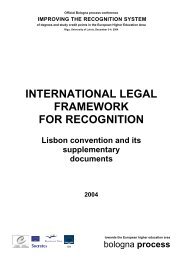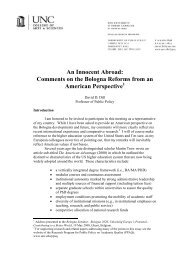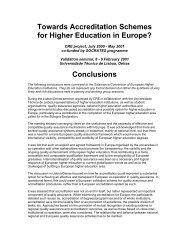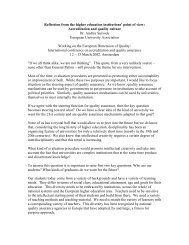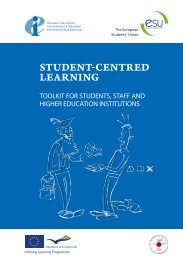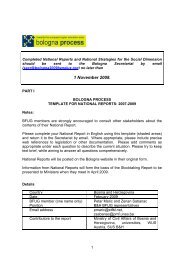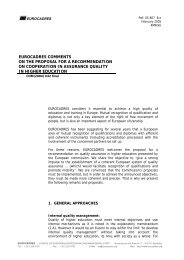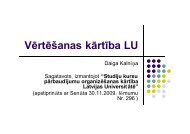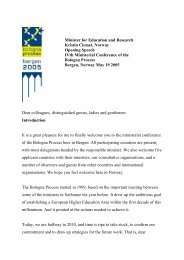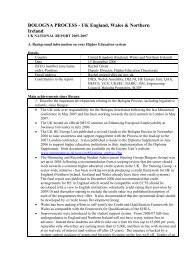EUA Survey Of Master Degrees In Europe - European University ...
EUA Survey Of Master Degrees In Europe - European University ...
EUA Survey Of Master Degrees In Europe - European University ...
Create successful ePaper yourself
Turn your PDF publications into a flip-book with our unique Google optimized e-Paper software.
9 EmployabilityAt their London summit in 2007, ministers called for closer HE-employer dialogue and promised tobring their public sector employment practices into line with Bologna. They also set up a workinggroup on employability and asked for report back in Leuven / Louvain-la-Neuve in 2009. Theworking group chose to focus on the Bachelor degree. How far does it help students secure andretain employment, take up self-employment, and navigate the labour market on a lifelong basis?How could employers come to accept Bachelor-level attainment as a valid qualification, in thosecountries in which no such qualification had previously existed?The Bologna three-cycle system cannot be said to be in place until this process is complete. <strong>In</strong> otherwords, until all 46 countries have evolved beyond the position in which the <strong>Master</strong> is the sole pointof initial entry into the market for high-skilled labour. Thereafter, the residual and multiple functionsof the second cycle – acquisition of high level competences and knowledge, research, innovationand knowledge transfer, access to doctorate, continuing personal and professional development –will be easier to map and to articulate on a pan-<strong>Europe</strong>an basis. Meanwhile, the definition of theBologna <strong>Master</strong> awaits the full fleshing out of the Bologna Bachelor.Employability and the BachelorEmployer-awareness campaigns are already in train – like the ‘Welcome Bachelor’ ventures mountedjointly by business and HE sectors in Austria and Germany – but it will be some time before theyproduce measurable results. Universities Austria, the conference of rectors of public universities, haslaunched a project on the employability of BA and MA degree holders. It is due to report in 2010and will show how far perceptions and practice have changed.Thus far the Bachelor has only just begun to consolidate its position. <strong>In</strong> Flanders the bankingcommunity has recognised it as an appropriate qualification for certain grades of work, on whichin-service training can build, but beyond the financial services sector it is considered too soon totell. The small number of employers, with whom <strong>EUA</strong> conversed in other countries, had contrastingviews. <strong>In</strong> Spain some were in sympathy with the aims of Bologna and were happy to provide workplacements during both Bachelor and <strong>Master</strong> programmes. <strong>In</strong> Germany they preferred the 4-yearBachelor with a placement element, leaving the <strong>Master</strong> to be taken later on a part-time basis asCPD.<strong>In</strong> Austria and Poland, they were more likely to share the view of students: sceptical regardingthe Bachelor, uncertain of its academic merits and its value in the labour market. <strong>In</strong> Poland,government was said not to have the led the way with the reform of public sector recruitmentpractices. <strong>In</strong> Austria, there is a telling distinction between the pre-nominal Magister – regarded asa prestigious title – and the post-nominal BA. Was ba part of the surname? one employer asked.Austrian employers nevertheless valued student mobility, whether at Bachelor or at <strong>Master</strong> levels;it increased assertiveness and laid the basis for more specific project management skills. <strong>In</strong> theNetherlands, according to the CHEPS report already cited, the university Bachelor (as opposed tothe UAS Bachelor) is not perceived as a viable labour market entry qualification.Employability and the <strong>Master</strong>Ministers have said that the dialogue with employers must intensify. <strong>In</strong> the Spanish private sectorand in Ireland employers have a role in curriculum development. <strong>In</strong> the German UAS sector they areconsulted on labour market analysis and provide work placements and guest lecturers. They mayalso have seats on formal course accreditation panels.56<strong>In</strong> Poland, employers evinced little knowledge of course content and of the Diploma Supplement.A similar view was reported in Sweden; attitudes there have begun to change, however, insofar as



